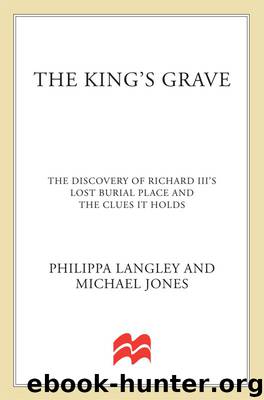The King's Grave: The Discovery of Richard III's Lost Burial Place and the Clues It Holds by Langley Philippa & Jones Michael

Author:Langley, Philippa & Jones, Michael [Langley, Philippa]
Language: eng
Format: epub
Publisher: St. Martin's Press
Published: 2013-10-22T00:00:00+00:00
8
Richard as King
ON 26 JUNE 1483, the first day of his reign, Richard III seated himself on the marble throne of the Court of the King’s Bench in Westminster and summoned the judges from all the various courts. The king made clear his wish ‘that they justly and duly administer the law without delay or favour’, emphasizing that they do so, ‘to any person, as well as to poor as to rich’. Richard’s concern for justice had been a feature of his rule of the north in his brother’s reign, and now it would become the signature of his own kingship. Richard would return to the Court of the King’s Bench on a number of occasions during his reign, personally observing important trials and discussing legal issues with the judges concerned. He demonstrated an unusual interest in the law for an English sovereign, and his enquiries were informed ones, showing that he had more than a layman’s legal knowledge. Richard would introduce important changes to the legal system, and his first and only parliament would pass major reforming legislation.
It remained to be seen whether these aspirations of good kingship would offset the controversial manner by which Richard had seized the throne. On 28 June 1483, two days into his reign, Richard III granted the dukedom of Norfolk to his loyal supporter John, Lord Howard. The introduction to the grant was both unusual and striking, showing – if we accept its rhetoric at face value – that Richard saw himself as being appointed by God as the man most suitable to be king: ‘We, who under his providential design rule and govern his people,’ the king began, ‘endeavour by his grace to conform our will and acts to his will … to illumine [honour] those noble and distinguished men who are most worthy of public weal [esteem]…’
The wording, which echoed the preamble to Richard’s foundation of a religious community at Middleham five years earlier, with its sense of destiny and spiritual protection, showed that Richard had moved beyond seeing his brother Edward IV’s marriage pre-contract as an impediment to his nephew’s claim to the throne. He now believed himself engaged on a divinely ordained mission of reform, one that would restore morality to a corrupt courtly way of life through a reinvigorated royal legislature.
Late medieval monarchy was a mixture of self-belief and pragmatism. John, Lord Howard had proven abilities, and was being promoted because he was a close ally of Richard and vital to the strength of his regime. And yet Richard was also righting an injustice. In November 1481 Howard ought to have received a half share of the lucrative inheritance of John Mowbray, Duke of Norfolk, on the death of his daughter and heiress Anne. However, Edward IV, strongly influenced by his queen, ignored both Howard’s rights and his proven record of loyalty to the House of York, and instead granted the lands to his younger son, Richard. This decision alienated Howard from the Woodvilles. Thomas More commented dismissively
Download
This site does not store any files on its server. We only index and link to content provided by other sites. Please contact the content providers to delete copyright contents if any and email us, we'll remove relevant links or contents immediately.
| Africa | Asia |
| Canadian | Europe |
| Holocaust | Latin America |
| Middle East | United States |
Fanny Burney by Claire Harman(25796)
Empire of the Sikhs by Patwant Singh(22188)
Out of India by Michael Foss(16317)
Leonardo da Vinci by Walter Isaacson(11927)
Small Great Things by Jodi Picoult(6112)
The Six Wives Of Henry VIII (WOMEN IN HISTORY) by Fraser Antonia(4801)
The Wind in My Hair by Masih Alinejad(4430)
The Lonely City by Olivia Laing(4133)
The Crown by Robert Lacey(4120)
A Higher Loyalty: Truth, Lies, and Leadership by James Comey(4044)
The Iron Duke by The Iron Duke(3655)
Millionaire: The Philanderer, Gambler, and Duelist Who Invented Modern Finance by Janet Gleeson(3577)
Sticky Fingers by Joe Hagan(3459)
Alive: The Story of the Andes Survivors by Piers Paul Read(3325)
Papillon (English) by Henri Charrière(3283)
Joan of Arc by Mary Gordon(3272)
Stalin by Stephen Kotkin(3095)
Aleister Crowley: The Biography by Tobias Churton(3031)
Ants Among Elephants by Sujatha Gidla(2930)
